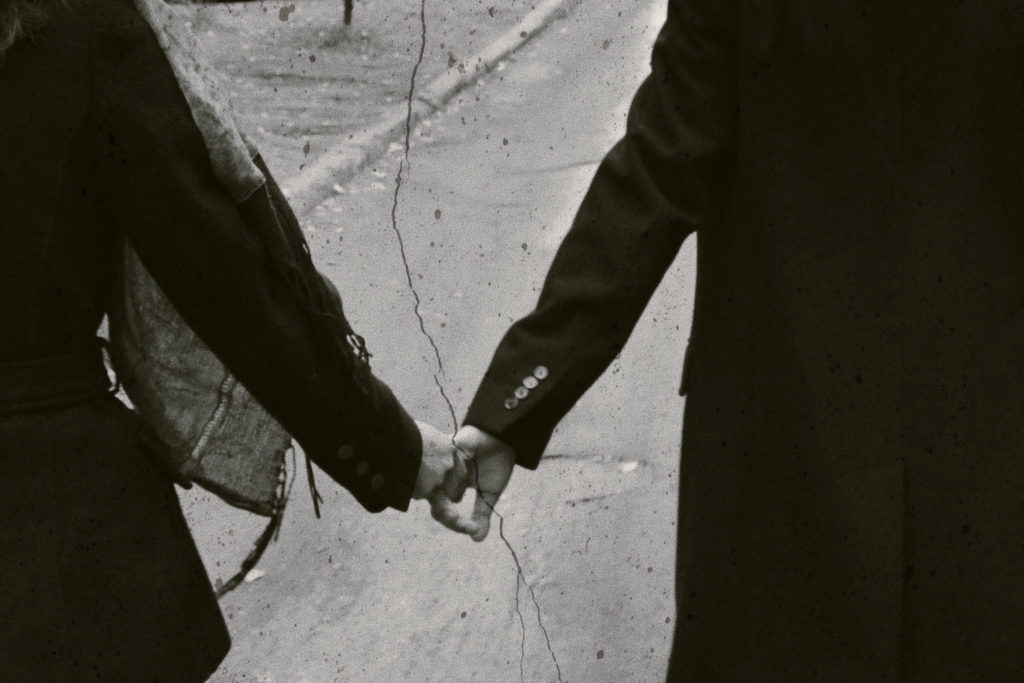Friends have half-joked about their relationships being propelled forward by life’s practical circumstances: Jan’s apartment was being sold, so she finally moved in with her boyfriend; Sarah got married so that her partner would be covered by her health insurance package.
But for M and I, seeing each other uncertainly, cautiously, for just a few weeks, it happened quickly. It was the season the city changed, becoming new and strange to us.
One morning, I walked into the café near work, the one I came to frequently, where I’d always bantered with the owners in their language and mine. They said, “Sorry, new policy,” and turned away, ignoring my order. Bewildered, agitated, I continued a few blocks to the community bakeries and grocery stores, but they were closed. Cardboard and strips of tape adhered shattered glass. Darkened storefronts, semi-legible graffiti across the walls. I made out the word, “Out.”
Who, I wondered, spinning. Me? Us?

Photo by Maxim Shklyaev on Unsplash
Soon we were apprehensive walking the streets, even in—especially in–the cozy neighbourhoods where our families had once settled, full of fragile hope. But some poison had leaked; sitting at once-friendly downtown terraces became exercises in quiet defiance. A tensed shoulder. Slight risk. Troubling scenes that gelled into familiar snapshots but took us a dazed moment to connect to their source: glares full of loathing, murmured curses, a passing shove. Spittle landing by our sandals on the summer pavement.
The season wore on, the city seemed to churn. Maybe not for everyone? We retreated, stayed quiet, trying to erase ourselves from view while still carrying on. As though, normalcy. My roommate called into work only a couple of times, usually after another incident drew weak condemnations from city officials: An isolated occurrence.
“I think it may be better to work from home today.”
Employers were understanding; they now often left early too, gathering their children from daycare, rushing home to hover over them in the relative safety of their kitchens.
But I continued to go out, see friends, spend time with M—our companionship still fresh, but becoming a comfort in these circumspect times.
One night at the bus stop, I was surrounded by angry men’s faces, their laughter booming. They stood too close, leaning in. Reaching towards my body. “She’s one, isn’t she?” they accused, confirmed, fingering my clothes, touching my jaw. I broke away and ran to M’s, not far. I heard their roaring laughs and clapping as I fled, my heart heaving. Frantic, I pounded on the door and he opened, expression pleased, then puzzled. I threw myself at him.
“Hide me,” I whispered into his soft throat. “Hide me in your basement.”
Instead he made me tea in the dim light of his kitchen and rested his big hand over mine, trembling on the rough wood of his table.
“Maybe unrelated.” “It’ll blow over,” and, “It wouldn’t happen here, for God’s sake,” he said.
All those phrases, deceptions the past still clutches. Ironic and cautionary, woven into my psyche. I leaned my forehead into the crook of my elbow.
“And they’d eventually come for me too, if what you’re saying is true,” he added.
I ran my hand over the stubble of his chin; his face, handsome and neutral, impossible to identify. A tall man who’d never learned to be afraid of strangers.
“I’m too visible, M.”
“But you speak the language, you’ve always lived here.”
“None of that matters. It’s not about that anymore. It’s all splitting at the seams.”
“You don’t need to hide in the basement. But stay till tomorrow.” He led me upstairs and held me, gentle, while I let my thoughts roam far away, silent and frantic, wondering what corner of the universe I could find refuge in.
That was the last night on this side of doubt, when we had the luxury of believing it would soon pass. That this lovable city would resume its warm rhythm for us. Instead, the next morning, we heard the drums sounding, harsh and humourless.
The violence swelled. Broken glass eventually gave way to broken, bloodied bodies, hurriedly cleaned up from the streets before lodging in anyone’s memory. We waited for strident international outrage, but what came was only a passing report of the facts. Historical missteps or present-day procedures cited as rationale for the unchecked fury sweeping the world.
Soon—for our security—we were relegated to one area where we were first advised, then ordered, not to leave after dark. We piled into the rooms of relatives and friends, bringing extra sheets and towels for what we hoped would be a short visit; we took in strangers. The neighbourhood was encircled by a gate and locked in the evening. For protection. Ours? The older residents, who had seen such things before, mouthed the worn word to each other before we were brave enough to speak it ourselves.
*
On the night the demonstrators shot the guards and tore down the gates, we huddled, clutching ourselves and each other close. We made furtive calls, sent out texts and updates.
Help us we’re trapped. Fingers tapping, a hectic pitch.
We muffled our screams as the rampage outside rattled the windows. We waited for the Molotovs to crash through to the crowded living room. The children sat wide-eyed with terror, toys and games sliding from their hands.
M got through in a text, before we lost reception and electricity.
I’m coming to you.
Don’t.
Don’t risk it, I meant. Don’t offer to die for me yet, my God, when I don’t know if I—or We–deserve it.
Who was this man to me anyway? We’d just met; I wasn’t even sure if he was someone I could love. I had stumbled away from it in a fog of fear my whole life and didn’t know how to recognize it now. Maybe he was just a life preserver to hang onto in these adrift, chaotic days. Or what I really wanted was the safety of the sturdy house he’d carefully built, brick and beam. And his assurance—so fascinating to me–across the breadth of the city. While I closed into my corner, accepting less of everything. Watched others stride out, taking their places.
When I become illegal, when it’s not just dangerous to have my face on the streets of this city, he could be my disguise. He would smuggle food while I kept cover. My thoughts, crafty fugitives. But what kind of attachment is that: love, or desperate dependence? When this ends, would I seek him out?
But he ignored me that night; he came. While I was tightening the knots of my fright, he drove as far as he could, then left his car to be pummelled and overturned. He forced himself through the crowds, beat against the door with his shoulder until I unlatched. Arms outstretched, he wrapped me in close. As though he knew something more than I did about our worth. Or about potential. As though loss had been thwarted.
We watched the street blaze from the door. While his lovely house stood calmly on its charming avenue on his side of the city, around the corner from the pretty café where I’d sat with him three short weeks before, under the afternoon sun. Where I’d thought, this guy is cute, but not for me. Too alien in his lack of foreignness, too at home in these easy, perfect surroundings. What has he known? We have no common experience, nothing to talk about. Where I’d thought then, before all this, we can get out unscathed if I just end it now. This well-intentioned man still has time to find a young woman with supple legs flowing out of tiny shorts to traipse with through a summer. Someone who’s deep enough but blithe enough too, who doesn’t demand too much, who isn’t tortured, whose mind isn’t a minefield. Whose heart yields, bold. He still has time to escape, to gravitate towards joy, to save himself from me. Even while bringing his wide palm to my lips, I told myself, it’s not too late to let this go.
But now it is too late, for both of us. Because he sped across the city, came through the flaming cars and a mob screaming for blood. He searched for my entrance through the smoke and howling children and weeping adults crouching inside fortressed houses. He came in the middle of this murderous riot to say he’s with me, with us, even though his face could write his fate elsewhere, could buy him a different kind of life, and more of it.
So that’s when I said yes to him, the rusty mail around my heart falling away, unfastened. Finally, after all these years, finally, my heart filling in the eleventh hour, the shadowy figures already moving towards us. I embraced him and let out a wail, realizing that I had never understood the meaning of commitment before M arrived at my door, knowing with a bottomless grief that in the end we wouldn’t be buried together.
 Sivan Slapak is a Montreal-based writer. Her stories have won and been shortlisted for fiction awards, and appear in publications such as The New Quarterly, Montréal Serai, JONAHmagazine and in an anthology published by Véhicule Press. Sivan works in the arts and culture sector of Montreal, and towards finishing a manuscript of interlinked short stories. (Photo credit Leslie Schachter)
Sivan Slapak is a Montreal-based writer. Her stories have won and been shortlisted for fiction awards, and appear in publications such as The New Quarterly, Montréal Serai, JONAHmagazine and in an anthology published by Véhicule Press. Sivan works in the arts and culture sector of Montreal, and towards finishing a manuscript of interlinked short stories. (Photo credit Leslie Schachter)